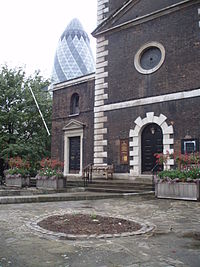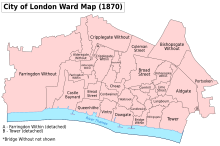Portsoken
| Ward of Portsoken | |
|---|---|
 St Botolph's Aldgate[1] | |
 Ward of Portsoken Location within Greater London | |
| Population | 985 (2011 Census. Ward)[2] |
| Ceremonial county | Greater London |
| Region | |
| Country | England |
| Sovereign state | United Kingdom |
| Post town | LONDON |
| Postcode district | E1 |
| Postcode district | EC3 |
| Dialling code | 020 |
| Police | Metropolitan |
| Fire | London |
| Ambulance | London |
| UK Parliament | |
Portsoken, traditionally referred to with the definite article as the Portsoken,[3] is one of the City of London's 25 ancient wards, which are still used for local elections. Historically an extra-mural Ward, lying east of Aldgate and the City walls, the area is sometimes considered to be part of the East End of London.[4]
The ward is about 5 hectares in area, and is mainly oriented north-south, with the central part informally known as Aldgate.
History[]
John Stow's Survey of London records that the "soke" – in this context the right to extract fines as a source of income[5] – (later "liberty") was granted in the time of Saxon king Edgar the Peaceful, east of Aldgate to a guild of knights, the Cnichtengild, in exchange, essentially, for regular jousting. Norman kings confirmed these rights but later the land was voluntarily transferred to the Priory of the Holy Trinity by the descendants of the guild.

In 1120 or 1121 (the exact date is unknown), the Portsoken was granted as a liberty to the Priory of Holy Trinity, which had been founded in 1107 by Queen Matilda, the wife of King Henry I. The sitting prior of Holy Trinity became, ex officio, an alderman of the City of London Corporation representing the Portsoken ward, and remained so until the Dissolution of the Monasteries by King Henry VIII in 1531.[6] The Ward originally extended as far south as the Thames, but the growth of the Tower of London beyond the line of the London Wall, disputes with the Tower, the creation of the Liberties of the Tower of London and other factors resulted in the southern area being lost to the ward and to the City of London as a whole, after around 1200.[7][8]
In 1332, a tax assessment showed 23 taxpayers in the Portsoken. However, this figure only included freemen of the City of London who possessed moveable property worth more than 10 shillings, and so did not include the poor, non-citizens, or members of religious orders.[9] A later subsidy roll from 1582 showed that the ward's taxpayers had been assessed to pay a total of 57 pounds, 11 shillings and 4 pence.[10]
The Portsoken has long had a mixed population, and in 1483 is recorded as having more aliens in its population than any ward in the City Of London.[11] Since the 1840s, nearly all of the Aldermen of the Ward have been Jewish.[12]
Boundary changes in 1994 and 2013 made often fundamental changes to the ancient Wards.[13] The Portsoken (in the City of London) and the neighbouring Tower Hamlets exchanged territory, with the Middlesex Street Estate being transferred to the Portsoken.[14]
Land was also exchanged with the Aldgate Ward (Aldgate was formerly entirely within the wall, with the Portsoken entirely without), so that John Cass's Foundation Primary School (now The Aldgate School) is now part of the ward, despite lying just inside the line of the wall.
The Portsoken is now regarded as one of the City's four residential wards, with a population of 985 (2011).[15]
Politics[]


Portsoken is one of 25 wards in the City of London, each electing an alderman to the Court of Aldermen, and commoners (the City equivalent of a councillor) to the Court of Common Council of the City of London Corporation. Only electors who are Freemen of the City are eligible to stand for election.
Keith Joseph, Secretary of State for Industry 1979–1981 and Secretary of State for Education and Science 1981–1986, took the area as his territorial designation on elevation to the Lords in 1987. Similarly, Peter Levene (Lord Mayor 1998–1999) in 1997. Joseph's father was Lord Mayor in 1942–1943.
In 2014 William Campbell-Taylor made history when he became the first ever party politician to win a seat on the City of London's Common Council, standing as a Labour candidate in a by-election in the ward of Portsoken.[16] William Campbell-Taylor stood down as a Common Councilman in March 2017 at the end of his time in office.[17]
In the 2017 City-wide Common Council elections, the Labour Party won two seats in Portsoken ward with local residents Jason Pritchard and Munsur Ali topping the polls and Independent incumbents John Fletcher and Henry Jones elected in third and fourth place respectively.[18] The Labour Party won a record total of five seats on the Common Council in March 2017, winning two seats in Portsoken, two seats in Cripplegate ward and one seat in Aldersgate ward.[19]
In December 2017, William Campbell-Taylor stood as the first ever party political candidate to contest a City of London Aldermanic election, standing for Labour in Portsoken ward, but was defeated by Independent candidate Prem Goyal.[20][21] Prem Goyal is the founder of the UK political party, All People's Party,[22] although to date Goyal has chosen to stand as an Independent in elections in the City of London.[23]
City of London Corporation election, 2017[]
On 23 March 2017 two Labour and two independent Common Councilmen were elected.
| Party | Candidate | Votes | % | ±% | |
|---|---|---|---|---|---|
| Labour | Jason Paul Pritchard | 230 | 20.03 | ||
| Labour | Munsur Ali | 210 | 18.29 | ||
| Independent | John William Fletcher | 197 | 17.16 | ||
| Independent | Henry Llewellyn Michael Jones | 187 | 16.29 | ||
| Independent | Ayesha Azad | 153 | 13.33 | ||
| Independent | Asif Sadiq | 111 | 9.67 | ||
| Independent | David James Barker | 60 | 5.23 | ||
| Turnout | 1148 | 50.7 | |||
| Labour hold | Swing | ||||
| Labour gain from Independent | Swing | ||||
| Independent hold | Swing | ||||
| Independent hold | Swing | ||||
See also[]
References[]
- ^ If you look carefully you can see the Portsoken Bulletin, detailing the ward officers.
- ^ "City of London Ward population 2011". Neighbourhood Statistics. Office for National Statistics. Retrieved 16 October 2016.
- ^ for instance, passim throughout "London 800-1216", by Brooke and Keir
- ^ Guide to tours of the Jewish East End published by LBTH, 2003, https://www.towerhamlets.gov.uk/Documents/Leisure-and-culture/Tourism/Visitor-information/Jewish-East-End-walk-leaflet.pdf
- ^ Citadel of the Saxons, by Rory Naismith, p. 163.
- ^ p45, Inwood, Stephen, A History of London (Macmillan, 1998), ISBN 0-333-67154-6
- ^ Haslam, Jeremy (1988). "Parishes, churches, wards and gates in Eastern London". In Blair, John (ed.). Minsters and Parish Churches: the local church in transition, 950–1200 (PDF). Oxford: University of Oxford Committee for Archaeology. pp. 35–43.
- ^ "London, 800-1216". Brooke and Keir, Chapter 7
- ^ p61, Inwood, Stephen, A History of London (Macmillan, 1998), ISBN 0-333-67154-6
- ^ 1582 London Subsidy Rolls, British History Online
- ^ Margins and marginality in 15th century London https://core.ac.uk/reader/190363108 Charlotte Berry
- ^ LBTH doc on the Jewish EE, inc the Portsoken. https://www.ideastore.co.uk/assets/documents/Local%20History%20Archives%20Online/walks/Jewish_History_Walk_Final_Version.pdf
- ^ The City and London Borough Boundaries Order 1993 (enacted 1994)
- ^ Corporation of London, https://www.cityoflondon.gov.uk/services/housing/housing-estates/Pages/middlesex-street.aspx
- ^ "Local statistics - Office for National Statistics". www.ons.gov.uk.
- ^ First ever party politician to win a seat on the City of London's Common Council [1]
- ^ peterkenyon, Author (10 March 2017). "Saying thank you and sending best wishes to Rev Dr William Campbell Taylor".
{{cite web}}:|first=has generic name (help) - ^ "Archived copy" (PDF). Archived from the original (PDF) on 9 November 2017. Retrieved 8 November 2017.
{{cite web}}: CS1 maint: archived copy as title (link) - ^ "Labour wins record five seats in historic City of London election victory". 24 March 2017.
- ^ labourportsoken, Author (29 November 2017). "Labour's candidate William Campbell-Taylor on why party politics has a place in the City".
{{cite web}}:|first=has generic name (help) - ^ Prem Goyal wins Portsoken Aldermanic election
- ^ Goyal, Prem. "All People's Party – gathering momentum in Southwark". www.obv.org.uk. Operation Black Vote. Retrieved 12 December 2017.
- ^ "Election results - City of London". mobile.cityoflondon.gov.uk. City of London Corporation. Retrieved 21 December 2017.
- ^ City of London Corporation: Notice of Persons Elected, 2017
External links[]
- Map of Portsoken ward City of London Corporation (2003–)
- Map of Early Modern London: Portsoken Ward - Historical Map and Encyclopedia of Shakespeare's London
- Wards of the City of London

